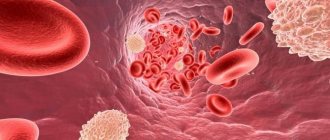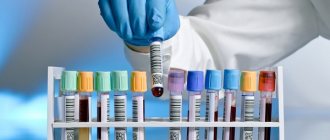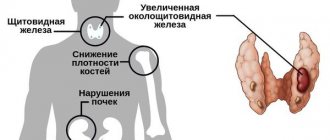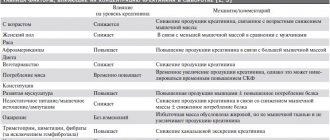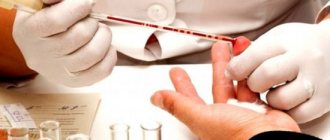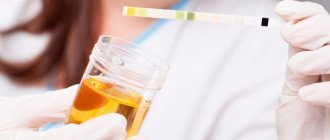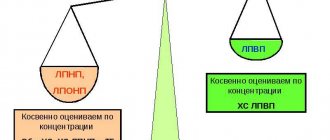Creatinine itself, being a breakdown product, no longer represents the slightest benefit for the body, and therefore is excreted from the body through the kidneys. In some diseases, the process of its elimination may be disrupted. Some physiological reasons also affect the level of creatinine in the blood.
Serum creatinine is always relatively stable because it is formed at the same rate. Normally, the level of creatinine is determined primarily by the volume of a person’s muscle mass: the better developed the muscles, the higher the level of this metabolite.
Indications for analysis
Most often, a creatinine test is prescribed to assess the filtration function of the kidneys. This research is also relevant for severe injuries and many diseases of various natures.
Indications:
- suspicion of the development of renal failure;
- any kidney diseases (pyelonephritis, polycystic disease, urolithiasis, glomerulonephritis);
- severe injuries or burns;
- any injury, atrophy or muscle breakdown;
- diseases of the endocrine system;
- diseases of the cardiovascular system;
- acute inflammatory diseases;
- sepsis;
- postoperative period.
Creatinine levels are affected by muscle mass. The larger it is, the higher the indicator. Photo: drobotdean / freepik.com
Features of a blood test for creatinine before computed tomography
The analysis is prescribed to assess the function of the kidneys and muscular system. The importance of studying the indicator lies in identifying its level. The concentration of the compound in the blood directly depends on the degree of damage to renal filtration. Creatine, along with other organic compounds, constitutes a molecule of residual nitrogen formed after the digestion of proteins. All non-protein parts are excreted through the kidneys. Other chemicals that reflect kidney function:
- Urea;
- Ammonia;
- Uric acid.
Their level determines how correctly the urination process is proceeding. What shows whether a computed tomography scan can be performed using contrast and whether complications will arise in the patient.
Preparing for analysis
The rules for preparing for a biochemical test to determine creatinine are not much different from the standards for preparing for any blood test. The study is carried out in the morning on an empty stomach (last meal no later than 8 pm). The day before the test you must:
- avoid nervous stress;
- limit physical activity;
- do not visit the sauna;
- do not drink alcohol;
- do not exceed the usual amount of meat dishes in the diet;
- avoid spicy, salty, fried foods;
- Stop smoking 1-2 hours before the test.
Of course, these rules complicate the patient’s life, but it is still necessary to adhere to them, otherwise the result of the study will be distorted, which may cause an incorrect diagnosis.
Patient preparation rules
Blood, UrineStandard conditions:
In the morning, on an empty stomach.
Toilet the external genitalia. The first morning portion of urine is in the toilet, drink 200 ml of water, an hour after drinking the water, take the blood into a vacutainer with a separating gel, after another hour the patient must urinate, collecting the entire portion of urine in a plastic container. Important:
Be sure to indicate the volume of urine collected.
You can add this study to your cart on this page
Normal blood creatinine level
Up to 15 years of age, gender does not affect the reference values - the norm of creatinine content in a biochemical blood test (S-Crea) during this period changes only depending on age.
With the onset of puberty, hormonal changes make their own adjustments, so after 15 years, the reference values for men and women change. For convenience, we provide a table. Table 1. Normal blood creatinine levels by age and gender.
| Age/gender | Normal indicator | |
| Newborn babies | 20 - 75 µmol/l | |
| Under 1 year | 15 – 37 µmol/l | |
| 1 – 3 years | 21 - 36 µmol/l | |
| 35 years | 26 - 41 µmol/l | |
| 5 – 7 years | 27 - 51 µmol/l | |
| 7 – 9 years | 34 - 52 µmol/l | |
| 9 – 11 years | 33 - 66 µmol/l | |
| 11 – 15 years | 45 - 75 µmol/l | |
| Over 15 years old | Men | 60 – 105 µmol/l |
| Women | 42 – 80 µmol/l | |
general characteristics
Purification of the blood from metabolic products is ensured mainly by the kidneys (glomerular filtration, tubular secretion and reabsorption). Endogenous creatinine clearance is a hemorenal test that evaluates the cleansing capacity of the kidneys. The method is based on calculating glomerular filtration based on the rate of plasma purification from creatinine, which normally enters the urine only by filtration and, after passing through the glomeruli, is not reabsorbed in the tubules. Therefore, a decrease in creatinine excretion in the urine and an increase in its concentration in the blood indicate a decrease in filtration in the kidneys. After 40 years, glomerular filtration decreases by 1% annually. Glomerular filtration is determined by the formula: V(pl) = U(cr) x V(m) / C(cr)xT, where V(pl) is the volume of plasma filtered through the renal filter per minute; V(m) - volume of urine for a given time; C(cr)—creatinine concentration in plasma (serum); U(cr) - creatinine concentration in urine; T is the urine collection time in minutes. Since the minute volume of filtration in the kidneys depends on the height and weight of a person, to normalize the indicator in people who deviate significantly in size from the average values, creatinine clearance is recalculated to the conditional value of the standard average body surface (1.7 m2), taking into account the person’s height and weight.
Causes of elevated creatinine
The reasons that cause an increased level of creatinine in the patient’s blood can be divided into physiological and pathological.
Physiological reasons:
- large amount of muscle mass;
- strength sports (powerlifting, bodybuilding, wrestling, etc.);
- eating a lot of meat dishes;
- the use of certain medications (tetracycline antibiotics, cephalosporins, non-steroidal anti-inflammatory drugs).
Fasting affects creatinine levels
One of the common physiological causes of increased creatinine levels in the blood is prolonged fasting.
If the body does not receive the required set of amino acids and nutrients, it begins to use its own muscle tissue as a source of nutrition. As a result of the destruction of muscle fibers, an increase in creatinine levels occurs. Therefore, excessive enthusiasm for fasting is fraught with the development of muscular dystrophy. Fasting is one of the reasons for increased creatinine in the blood. Photo: freepik.com
Pathological reasons:
- acute and chronic kidney diseases;
- obstruction of the urinary tract;
- diseases of the cardiovascular system (the kidneys suffer due to impaired blood supply);
- excessive activity of the thyroid gland (from excessive synthesis of thyroid hormones, the process of breakdown in the muscles begins);
- radiation sickness;
- oncological neoplasms;
- ruptures, compression and other muscle injuries;
- septic shock;
- extensive burns;
- endocrine pathologies.
Consequences of deviation of creatinine from normal
First, you need to understand the reason for changes in serum creatinine levels. If deviations from the norm are due to physiological reasons, there is no particular reason to worry. However, even some physiological features should still be paid attention to.
For example, if eating large amounts of meat is not due to an increased need for protein in the body (a direct need exists for athletes, for whom protein is an important component of nutrition that ensures muscle growth), this can lead to gout, as well as deterioration of the kidneys and liver . Of particular concern in this regard are predisposing factors such as slow metabolism, as well as concomitant liver and kidney diseases.
If the deviation of the creatinine level from the norm is explained by any pathological reasons, comprehensive treatment should be started in a timely manner to prevent the disease from worsening.
Increased blood creatinine levels occur in children and adolescents as a result of active growth.
When is it necessary to take a creatinine test before a CT scan with contrast?
Analysis is not required if:
- The patient's age is less than 70 years;
- There is no history of kidney disease or organ surgery;
- There is no history of diabetes mellitus;
- There is no history of gout;
- There is no history of arterial hypertension.
In other cases, there is a high risk of contrast intolerance, up to anaphylactic shock.
You can clarify the advisability of a blood test for creatinine before a CT scan with contrast during a consultation with your doctor or by calling our center’s helpline.
How to reduce creatinine in the blood
The first thing to remember is that self-treatment can do more harm than good. An increase in creatinine in a biochemical blood test very often indicates the presence of dangerous diseases, so you should completely trust your doctor when choosing medications.
In case of kidney damage or diseases of the cardiovascular system, the patient is offered hospitalization and treatment at a hospital. In addition to treating the underlying disease that has caused an increase in creatinine levels in the blood, the doctor prescribes medications to normalize protein metabolism. Extracorporeal detoxification is also used - this is a complex procedure for hardware blood purification. The most commonly used method is hemodialysis: the patient's venous blood is purified through a complex filter (dialyzer), and then returned back to the venous bed.
More vegetables and fruits in your diet! A proper diet helps normalize creatinine levels. Photo: sommail / freepik.com
An important aspect of normalizing creatinine levels is diet. You will have to give up many of your favorite dishes, but the results are worth it.
Foods to reduce creatinine levels:
- vegetables and fruits (preferably fresh or boiled);
- fermented milk products (kefir, fermented baked milk, yogurt);
- buckwheat;
- oatmeal;
- Brown rice;
- durum wheat pasta;
- rye and bran bread;
- nuts;
- honey.
To speed up the process of removing excess creatinine from the body, drink more purified water - preferably at least 1.5 liters per day. However, it should be remembered that if you have kidney disease, the amount of fluid per day should be limited.
Prohibited products:
- fatty meats, poultry and fish;
- whole milk;
- spicy seasonings;
- smoked meats;
- conservation;
- strong tea and coffee.
The consumption of meat and eggs should be kept to a minimum: 2-3 “meat” days per week are allowed. Moreover, even on such days, the amount of meat (as well as poultry and low-fat fish) should be moderate: no more than 150 grams of meat and 1 egg per day.
How to increase creatinine in the blood
As with increased creatinine levels, you should start by eliminating the cause. Since a decrease in creatinine in the blood is most often explained by physiological reasons, you should analyze your own diet and lifestyle.
Adherents of therapeutic fasting must understand that a healthy balance is important in everything: you should not undermine your health by refusing the substances the body needs.
Low creatinine often occurs in athletes whose diet does not correspond to the level of physical activity. Many novice athletes, in an attempt to build muscle mass, act on the principle of “more is better”, exhausting themselves with unnecessarily hard training and at the same time completely forgetting about the importance of a balanced diet.
The body needs not so much creatinine itself, which is the end product of energy metabolism, but creatine phosphate, which provides the muscles with the necessary energy and strength. It is during the breakdown of creatine and creatine phosphate that creatinine is formed.
List of recommended products:
- meat and poultry;
- fish (herring, salmon, tuna are especially rich in creatine);
- pumpkin seeds;
- eggs;
- nuts;
- legumes
